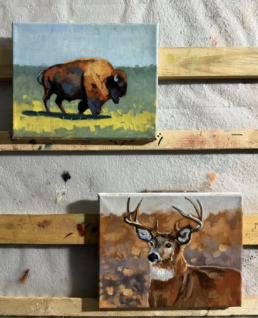 Guest author: ArtBistro. The following article was originally posted on ArtBistro
Guest author: ArtBistro. The following article was originally posted on ArtBistro
For the majority of the last 100 years, artists have sold work through commercial galleries and is the most desirable way for artists to make a living.
What should you expect or ‘not’ expect from gallery representation?
Read on for some useful expectations for gallery representation, as well as how best to get noticed and whether artists need representation.
Commercial galleries usually sell artists’ works on commission. The typical commission is usually 50% of the sale of the work. This is determined by the contract. There are several contracts that galleries enter into with artists.
The range of various contracts are outlined here:
Consignment Contract
A consignment contract is written when an artist loans a specific number of works of art to the gallery for the gallery to sell for a specific amount of time.
An itemized list is made, the terms of sale are set forth as well as a time for the works to be returned if not sold. At this time, a deadline of payment is also agreed upon. Typically galleries pay in full within 60 days after the sale. Note: When included in a group show the gallery may use this type of contract.
Representation Contract
At the other end of the spectrum of artist and gallery relationships is one that gives the gallery the right to sell any of the work that you produce. The gallery or art dealer becomes your exclusive agent and they will represent you as one of their artists. You will have solo shows with this gallery, although these shows may or may not be stipulated in the contract. And while these terms may seem restrictive to an artist, they are important to an artist’s financial security, especially if the work sells well. This example of gallery representation is the most common agreement of all gallery contracts.
Additional Agreements
Many further agreements can exist between an artist and a gallery and can vary between the two aforementioned examples.
For example:
- A gallery in the area may be interested only in showing an artist’s work in that city or geographic area. This leaves the artist free to seek further representation in other locations.
- Keep in mind that many galleries will be slow to enter into a binding contract early on in an artist’s career.
- Most times they’ll want to show the work for a group or one solo show to see how it goes before taking on representation.
This being said, any gallery show is a good opportunity to get your foot in the door and every effort should be made to make your time with the gallery both constructive and lucrative. But, not all artists need gallery representation:
Ed Winkleman, owner of Wikleman Gallery in Chelsea says, “Not every artist needs or should even be affiliated with a commercial art gallery. The system works really well for some and not at all for others. Because many commercial art galleries are good at generating press for their artists and exist to place work in prominent collections, though, I think there is a somewhat misguided view among younger artists about how essential getting into a gallery is for their careers. It can be essential, but there are plenty of artists with galleries (even very high-profile galleries) whose careers are no better off (in fact sometimes worse) than many artists without galleries that I know. The key is to find a gallery that’s a good match for your art and aspirations, NOT to find any gallery at any cost to your pride or goals. If no gallery is well suited, then find other means of pursuing your dreams.”
Why would an artist want a gallery or a dealer to represent their work?
There are several reasons…
1. They Will Market Your Work
One of the advantages of having a gallery represent you is that in return for the cut they receive of your commission, they will promote your work. Common practices of galleries are to send out announcements, write a press release and distribute it to the press, pay for the opening reception, pay for the shipping of your work to and from shows (if included in the contract), handle requests from press and others for images, and information about your work.
This frees you up to focus on making your work rather than promoting it. However, that being said, all artists have to promote their work even if they have gallery representation. Most galleries appreciate the efforts of their artists to promote their work through making connections in the art community, referring buyers to them, and generally showing up when ask to at functions that will help sell the work.
2. Prestige of the Gallery
Some artists are more famous than others. Some galleries are more famous that others. Which came first, the famous artist or the famous gallery or dealer? It is a chicken and egg question. It would be great to be picked up by a famous gallery just out of grad school, but that happens to just a few artists. Galleries have reputations and you should be pay attention to them.
A well thought of gallery can be a great boost to your work no matter if it is a local or national gallery.
3. Galleries Will Sell Your Work
A dealer’s connections can be a huge boon to selling your work. Dealers know collectors who may be interested in your work. Many collectors rely on dealers to help guide them with their collections and educate them about new artists. Many galleries have relationships with galleries in other cities and countries making it possible to show your work to a broader geographic audience.
Most importantly some galleries have relationships with museums that would help your work become acquired. Try to find out from others in the art community how well connected the gallery is that you are interested in.
This may be a determining factor if they are the right fit for your ambitions.
4. A Professional Venue for Your Work to Be Seen
Context for artwork can have a very big influence on how the work is interpreted by viewers and collectors. Many people buying art would rather go through a trusted dealer whom they know rather than contacting an artist directly to buy their work. Showing your work in a commercial space gives it a professional context.
Some artists are good business people and promoters of their work; they may not feel the need for a gallery to represent them. However, for many artists getting gallery representation is the start of an exciting career. To do this work on your communication skills with your business and personal relationships. If you have success in other areas of you life where you have partnerships, a gallery relationship will likely be a good one for you.
Try to improve your business and relationship skills if you struggle with them.
*ArtBistro featured writer Amy Wilson has this to add about on-going relationships with galleries:
“Like all serious relationships, the one that exists between the ”http://artbistro.monster.com/benefits/articles/8862-how-to-get-commercial-gallery-representation”>gallery and the artist needs to be based on mutual respect and open communication. Figure, you are leaving your work at the gallery and then you are going home (or to your studio to make more) – which means that the gallery is in the situation of presenting your work to the public, answering any questions they may have, and explaining what you do and why you do it. It is incredibly important that they understand you and your work, and that they take the time to really listen and find out why you make the work you do.”
Extra Tips:
- Be cautious about entering into contracts with galleries with which you have little experience or are not aware of their reputation.
- Ask your fellow artist friends, ArtBistro friends, or contact an artist they represent for further information.
- While a foot in the door is an advantage for any artist, there are some galleries known to take advantage of artists.
- Needless to say, these should be avoided.
- Checkout ArtBistro’s gallery rating feature to be sure you’re entering into contract with a fair and reputable gallery.
*****
Thank you to my friends at ArtBistro for sharing this great information. Please stay tuned on Mondays more useful articles by ArtBistro!!! ~Lori
PS. Do you have a commercial gallery, or do you represent yourself? I’d love to hear from you in the comment section…
These other articles have a lot of valuable information, enjoy:
10 Tips to Bring Visitors to Your Art Fair Booth or Open Studio
7 Creative Ways to Approach an Art Gallery for Representation
3 Steps to Find Art Gallery Representation
Visual Artist’s Challenge II – Balancing Self Promotion & Gallery Representation
You Are in Charge of Your Art Career!
Commissioned Art – Tips to make it a Success!
Create a Powerful Portfolio
The Right Art Gallery – How to Find One
How to Bring Out the “Mona Lisa” in Your Own Artwork








Hi Lori,
Found this one via a Retweet just a minute ago. I have a question for you regarding galleries. Is it common practice for a gallery to require you to pay a monthly fee AND take a commission off the top?
Thanks!
Bill Werle
Hello Bill-
It is great seeing you here on my site. Thanks.
No, that is not standard practice amongst commercial galleries. Most likely you are dealing with a ‘vanity gallery’ where the gallery charges a fee for the artist to exhibit. Personally, I am not a fan of this practice. Artists get gouged enough as it is nowadays. Let me know what you think.
Lori 🙂
Lori,
I’ve been lurking here for a long time now!
Here’s the deal. I’ve not paid them and they haven’t pushed it with me for some reason but reality is they do charge a monthly fee AND 40% commission on sold paintings. I have helped them out with their computers (they know what I used to charge 🙂 ) so maybe they consider that covers my fees?
I would like to reiterate your “extra tips” above for those that may come across this to always read any agreement presented to you by a gallery. It’s common sense but it’s also easy to gloss over the fine print. Don’t gloss! I was presented with a contract by them that gave up control of my art career to them for a year. Needless to say I told them no, told them why and what they needed to change before I’d sign anything. They did make the changes but oddly enough haven’t asked me to sign it… 😉 Needless to say this whole “gallery” relationship has been a learning experience in the business side of art.
Thanks to artists like you Lori who so so generously share the wealth I’m “book smart” in the do’s and don’t s on the business side of art which has helped prepare me for when real life experience rears it’s head.
Bill
Thanks for the added tip. The devil really is in the details…so, reading that fine print is important! Hmmm…it sounds to me like you might want to find yourself another gallery. I have learned that if a gallery is flaky or questionable in the beginning, they most likely will be very difficult to work with during your relationship. That is my two cents…there are always exceptions, but I also don’t like them charging you, plus a 40% commission. You can do better.
Let me know what you decided Bill.
Good luck with this decision-
Lori 🙂
Lori,
Thanks so much for taking the time to discuss this. “Hmmm…it sounds to me like you might want to find yourself another gallery.” In discussion with a long time Spokane artist last night he also reiterated what you have stated. I have been active in getting my work into other venues and will be moving on shortly. The writing has been on the wall from the beginning but I chose to ignore my gut instincts throwing up the red flags. It’s been one of those lessons learned that remind me that being naive (i.e. too trusting) in the business side won’t cut it.
Thanks again Lori, your the best.
Bill
Bill, I just saw your follow up comment. Thanks for the kind words. People like you make this all worth the effort and time away from my own painting. Good luck Bill and keep me posted!
Lori 🙂
Hi Bill, I tried replying to this comment via my cell phone, but now that I am home and on my computer, I don’t see my reply. Please check my follow up response.
Lori
Due to the size of the galleries cut I have personally not decided to try to use this route. I have created , and joined other like minded artists and created ‘art societies’ and have done our own exhibitions (try to give them a theme /interest). Most of our exhibitions are usually free , and the proprieters cut can be as low as 10%. All you need tyo do is make a professional approach to local public bodies, preferably in richer towns , and the vast majority of them are very accomodating. Also as there’s a reccession, a lot of councils are now allowing artists to exhibit in empty shops completely free, as it looks better for them than having an empty shop.
If you do choose a gallery, make sure it nmatches your style, else you’ll just be wastnig your time.
Hello. My name is Richard. I’m 44 years old (wishing secretly to be 30 years old). I’ve been painting for 15 years old. Everyone surrounding me is pushing me to starting showing and selling. I have roughly 200 paintings. (I’m tired and covered in paint) so I entered the two difficult juried shows in New York City. The Allied Artist show at The Players Club and The Salma Gundi gallery. They gave me a bit of validation. Then I wanted to get reviewed by some of the top echelon. I submitted my work to be reviewed to the metropolitan and got a good review. I then submitted my work to the head of the Contemporary Art Dept of Sotheby’s in New York. Again I recieved a good review from Alex Rotter ( a nice letter). So I have all the confidence to succeed. (I’m scared to death). I looked for art reps and for the life of me I find that 90% will only do secondary sales representing. (I.e. no new artists.) I find the remainder all want money to even LOOK at your work. (I can have my neighbor do that). To tell you the truth it’s incredibly disheartening. I’m a bit old fashioned and believe in the OLD way of doing things. Rep, gallery, sales. I have sold many off. But at this time in my life I’m looking to make real sales and a name. I’d hate to think I did this for nothing as that makes feel worthless. If you could please help in the matter I’d appreciate it. I’m worth it.
Hello Richard, I feel your frustration when I read your words. However, it seems that you have had more validation than many seasoned artists. Congrats on that. Becoming an overnight success is not impossible, but not easy. Artists work many years to achieve the career status for which you are seeking.
It seems that you are putting A LOT of pressure on yourself. I have suffered from that myself! Be assured, you are still young enough to succeed. I know many artists who are enjoying artistic successes who have begun their careers after retirement.
Depending upon your genre of work, I would suggest entering some juried shows and museum exhibitions to build your resume. For example, a traditional oil painter might consider joining Oil Painters of America and entering the OPA’s different juried annual exhibitions. This would be a way to capture the attention of galleries, magazines and peers. You can also use social media to promote yourself and consider using traditional print media too…
I am always leery of any gallery or rep who wants money up front. I had a rep years ago, and I never paid her unless she sold something. But, I do not have the need for a rep. My galleries, together with my online presence do the job for me now.
I hope I’ve helped you a little.
Good luck,
Lori 🙂
*http://fineartamerica.com/profiles/lisa-kramer.html Link to where much of my work is posted; as web site only has older work currently posted. Yes, need to get on that, lol.
Hi Lori:
I’ve been a reading fan from afar since I discovered you on Twitter. I’m fairly new at Twitter, as well as the biz side of art. My story is very similar to Richard’s. I’ve received checks & awards from winning, and / or placing in juried contests. The information you gave him was very useful to me. Like him, I needed to feel some validation too (even though I’ve been an artist since I could pick up a crayon). I have encountered the pay by month, a contract that stated my career and all work was “owned” by the gallery for three yrs., whether or not they showed my work, with a ridiculous radius of their “territory;” and I was asked if I could ‘replicate just part of a panting’ (the face of a cubism work; as they didn’t think the rest of it was appropriate) & have it mass produced for hotels… at the time I was extremely new to trying to get representation and didn’t realize perhaps that would have been at least a start for me. I felt it would ruin the nature of the work at the time. After that, I basically gave up on the business of getting my work representation. I’ve never done an art fair booth setup, or most of your suggestions. Do you recommend a place to find out art opportunity information like you suggested here. Like OPA: I didn’t know it even existed, lol. Thank you for your continued great and informative articles. I can tell your success is well-deserved. Regards.
Hello Lisa,
Nice to see you here on my blog! Thank you for the nice comment. I have an upcoming blog post that will be very helpful to you! Stay tuned…and if you have more questions after reading it, let me know.
Lori 🙂
i have really been concern about how to get gallery to represent my art and how to go about this. this is really helpful and appreciate it. in the case of getting foreign gallery representation how does one go about it. do i have to rely on mails
First of all, many thanks for your comment and my sincere apologies for the belated reply!! I hope you have found a gallery by now. If not, read this https://www.finearttips.com/2010/08/3-steps-to-find-art-gallery-representation/